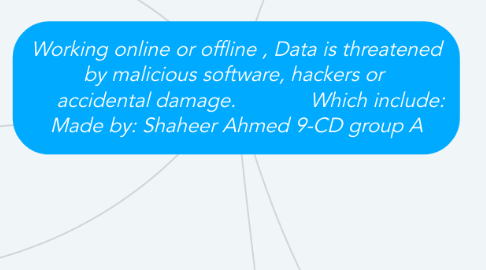
1. Phishing
1.1. Meaning: A scam by which an Internet user is duped (as by a deceptive email message) into revealing personal or confidential information which the scammer can use illicitly.
1.1.1. Effects:
1.1.1.1. Lose of accounts and personal data.
1.1.1.2. Leads to identity theft such as passwords usernames, credit card, bank account information, etc
2. Pharming
2.1. Meaning: Pharming is a technique through which one can create a fake website that looks like a real one for instance web bank page, and then collect the information users think they are giving to their real bank.
2.1.1. Effects
2.1.1.1. The effects are same as pharming.
2.1.1.2. Creator of code can gain personal data such as bank account numbers.
2.1.1.3. Can lead to fraud or identity theft.
3. Distributed Denial of services (DDOS):
3.1. Meaning: DDoS stands for distributed denial of service but is often referred to as a simple denial of service. A DDoS attack consists of a website being flooded by requests during a short period of time.
3.1.1. Effects
3.1.1.1. Leads to the crash of website.
3.1.1.2. Any kind of secret or important information can be exposed.
3.1.1.3. It can cause multiple identity thefts
4. Hacking
4.1. Meaning: The gaining of unauthorized access to data in a system or computer.
4.1.1. Effects: Once a hacker successfully hacks in the victim's computer he can gain ill eagle access to many personal information like: Hijack your usernames and passwords
4.1.1.1. Use and abuse your Social Security number
4.1.1.2. Steal your money and open credit card and bank accounts in your name
4.1.1.3. Ruin your credit
4.1.1.4. Make purchases
4.1.1.5. Add themselves or an alias that they control as an authorized user so it’s easier to use your credit
4.1.1.6. Obtain cash advances
4.1.1.7. Sell your information to other parties who will use it for illicit or illegal purposes
5. Malware
5.1. Virus
5.1.1. Meaning: A computer virus is a malicious program that self-replicates by copying itself to another program. In other words, the computer virus spreads by itself into other executable code or documents.
5.1.1.1. Effects: Once the computer virus executes into a computer it causes a lot of damage which include:
5.1.1.1.1. The computer speed becomes slower than normal.
5.1.1.1.2. It change and corrupts the computer and user files in hardware and as well as in workable media.
5.1.1.1.3. It steals private data such as usernames, and password.
5.1.1.1.4. The computer works differently and violently. This also causes overheating sometimes.
5.1.2. Trojan horses
5.1.2.1. Meaning: A trojan horse, or trojan, is a form of malware that disguises itself as a harmless file or application to mislead users of its true objective. The trojan will be released on the user s device with a click or download of the seemingly innocent program.
5.1.2.1.1. Effects: If Trojan horses are left undetected on a computer it cause a disastrous effect. Such as:
5.2. Worms
5.2.1. Meaning: A computer worm is a standalone malware computer program that replicates itself in order to spread to other computers.
5.2.1.1. Effect:
5.2.1.1.1. It slows down a computers speed and performance.
5.2.1.1.2. It take up all the space in hard drive.
5.2.1.1.3. It deletes personal or computer files and corrupts them up.
5.3. Malicious Software's:
5.3.1. Adware
5.3.1.1. Meaning: Adware is a malware which launches advertisements, mostly in the form of pop-ups.
5.3.1.1.1. Effects:
5.3.2. Ransomware
5.3.2.1. Meaning: A type of malicious software designed to block access to a computer system until a sum of money is paid
5.3.2.1.1. Effects
5.3.3. Spyware
5.3.3.1. Meaning: Software that enables a user to obtain covert information about another's computer activities by transmitting data covertly from their hard drive.
5.3.3.1.1. Effects
6. Denial of Service Attack (DOS)
6.1. Meaning: Denial-of-Service (DoS) attack, a type of attack on a network that is designed to bring the network performance down by flooding it t with useless traffic (data).
6.1.1. Leads to the crash of website.
6.1.2. Any kind of secret or important information can be exposed.
6.1.3. It can cause multiple identity thefts
